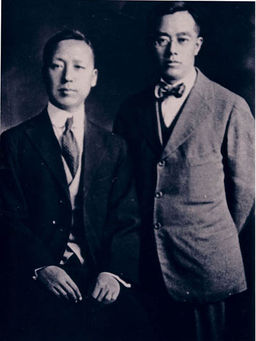Kim Kyu-sik
|
|
|
| Korean spelling | |
|---|---|
| Hangeul | 김규식 |
| Hanja | 金奎 植 |
|
Revised Romanization |
Gim Gyu-sik |
|
McCune- Reischauer |
Kim Kyusik |
Kim Kyu-sik (born January 29, 1881 in Busan , then Korea , now South Korea , † December 10, 1950 near Manpo , North Korea ) was a Korean politician and independence activist. He was Vice President of the Provisional Government of the Republic of Korea .
He was born in Dongnae (now part of Busan) and orphaned at an early age. He was raised by US missionaries and was given the name "Johann" by them. Later, he traveled to the USA and acquired at Roanoke College in Virginia the Bachelor Accounts. He then studied at Princeton , where he obtained his master's degree in 1904 .
In 1905 Kim returned to Korea and took up teaching. After Korea was annexed by the Japanese Empire in 1910 , Kim went into exile in China .
As Plenipotentiary of the Provisional Government, Kim Kyu-sik traveled to Paris to achieve independence for Korea from Japan at the Paris Peace Conference in 1919 . It was sent by Yuh Woon-hyung and Chang Duk-soo , who had established the Sinhan Cheongnyeondang in Shanghai in the summer of 1919 . But his efforts proved to be fruitless because the US, the 14-point program of President Woodrow Wilson on the self-determination considered in favor of the then ally Japan less important.
At Roanoke College in Salem, Virginia , he received his doctorate in law in 1923. In 1935 he founded the People's Revolutionary Party ( 민족 혁명당 ) in Nanjing . He was a leading member of the Provisional Government of the Republic of Korea , of which he was Vice President in 1940 under Kim Gu .
After Korea's independence from Japan at the end of World War II in 1945, he returned to his homeland to help establish an independent state. The country was divided into two zones of occupation between the Soviet Union and the United States. The American military government, together with Yuh Woon-hyung, preferred Kim as a moderate politician for building a new government. In September 1947, the United States put the Korean question on the agenda of the UN , which had been founded a few years earlier . It was decided to hold elections in South Korea in 1948, regardless of objections from Korean politicians.
After all efforts to unify Korea had failed, Kim withdrew from politics. When the Korean War broke out in 1950 , he was kidnapped and taken north. He died there a little later near Manpo on December 10, 1950.
Web links
Individual evidence
- ↑ a b Biography of Kim Kyu-sik in the Doosan Encyclopedia . Retrieved November 3, 2013 (Korean).
- ^ A b Eckert, Carter J., Lee, Ki-baik, Lew, Young Ick, Robinson, Michael & Wagner, Edward W. (1990). Korea old and new . Seoul: Ilchokak.
| personal data | |
|---|---|
| SURNAME | Kim, Kyu-sik |
| BRIEF DESCRIPTION | Korean politician and independence activist |
| DATE OF BIRTH | January 29, 1881 |
| PLACE OF BIRTH | Pusan , what was then Korea , now South Korea |
| DATE OF DEATH | December 10, 1950 |
| Place of death | near Manpo , North Korea |
